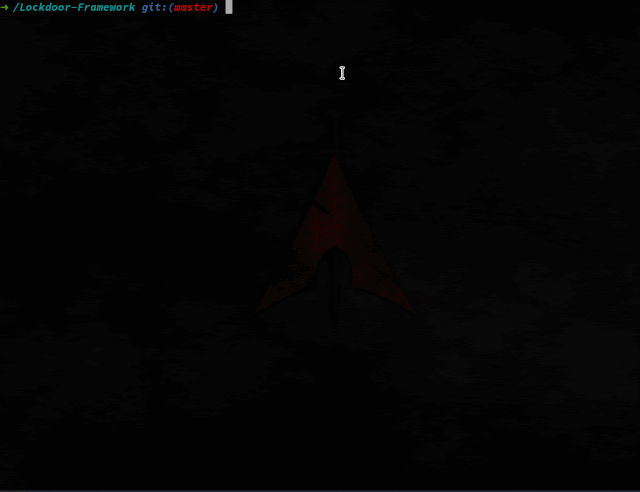Lockdoor Framework : A Penetration Testing Framework With Cyber Security Resources.
09/2019 : 1.0Beta
- Information Gathring Tools (21)
- Web Hacking Tools(15)
- Reverse Engineering Tools (15)
- Exploitation Tools (6)
- Pentesting & Security Assessment Findings Report Templates (6)
- Password Attack Tools (4)
- Shell Tools + Blackarch's Webshells Collection (4)
- Walk Throughs & Pentest Processing Helpers (3)
- Encryption/Decryption Tools (2)
- Social Engineering tools (1)
- All you need as Privilege Escalation scripts and exploits
- Working on Kali,Ubuntu,Arch,Fedora,Opensuse and Windows (Cygwin)
09/2019 : 0.6
- Information Gathring tools (13)
- Web Hacking Tools (9)
- Working on Kali,Ubuntu,Arch,Fedora,Opensuse and Windows (Cygwin)
- Some bugs That I'm fixing with time so don't worry about that.
Check the Wiki Pages to know more about the tool
- The Wiki pages :
Overview
LockDoor is a Framework aimed at helping penetration testers, bug bounty hunters And cyber security engineers. This tool is designed for Debian/Ubuntu/ArchLinux based distributions to create a similar and familiar distribution for Penetration Testing. But containing the favorite and the most used tools by Pentesters. As pentesters, most of us has his personal ' /pentest/ ' directory so this Framework is helping you to build a perfect one. With all of that ! It automates the Pentesting process to help you do the job more quickly and easily.
Features
Added value : (what makes it different from other frameworks).
Pentesting Tools Selection:
- Tools ?: Lockdoor doesn't contain all pentesting tools (Added value) , let's be honest ! Who ever used all the Tools you find on all those Penetration Testing distributions ? Lockdoor contains only the favorite (Added value) and the most used toolsby Pentesters (Added value).
- what Tools ?: the tools contains Lockdoor are a collection from the best tools (Added value) on Kali,Parrot Os and BlackArch. Also some private tools (Added value) from some other hacking teams (Added value) like InurlBr, iran-cyber. Without forgeting some cool and amazing tools I found on Github made by some perfect human beigns (Added value).
- Easy customization: Easily add/remove tools. (Added value)
- Installation: You can install the tool automatically using the installer.sh , Manually or on Docker [COMING SOON]
Resources and cheatsheets: (Added value)
- Resources: That's what makes Lockdoor Added value, Lockdoor Doesn't contain only tools ! Pentesing and Security Assessment Findings Reports templates (Added value) , Pentesting walkthrough examples and tempales (Added value) and more.
- Cheatsheets: Everyone can forget something on processing or a tool use, or even some trciks. Here comes the Cheatsheets (Added value) role ! there are cheatsheets about everything, every tool on the framework and any enumeration,exploitation and post-exploitation techniques.
Installation:
- Automatically
git clone https://github.com/SofianeHamlaoui/Lockdoor-Framework.git && cd Lockdoor-Framework
chmod +x ./install.sh
./install.sh - Manually
- Installing requirments
python python-pip python-requests python2 python2-pip gcc ruby php git wget bc curl netcat subversion jre-openjdk make automake gcc linux-headers gzip - Installing Go
wget https://dl.google.com/go/go1.13.linux-amd64.tar.gz
tar -xvf go1.13.linux-amd64.tar.gz
mv go /usr/local
export GOROOT=/usr/local/go
export PATH=$GOPATH/bin:$GOROOT/bin:$PATH
rm go1.13.linux-amd64.tar.gz - Installing Lockdoor
# Clonnig
git clone https://github.com/SofianeHamlaoui/Lockdoor-Framework.git && cd Lockdoor-Framework
# Create the config file
# INSTALLDIR = where you want to install Lockdoor (Ex : /opt/sofiane/pentest)
echo "Location:"$installdir > $HOME"/.config/lockdoor/lockdoor.conf"
# Moving the resources folder
mv ToolsResources/* INSTALLDIR
# Installing Lockdoor from PyPi
pip3 install lockdoor
- Installing requirments
- Docker Installation
COMING SOON
Lockdoor Tools contents:
Information Gathering:
- Tools:
- dirsearch : A Web path scanner
- brut3k1t : security-oriented bruteforce framework
- gobuster : DNS and VHost busting tool written in Go
- Enyx : an SNMP IPv6 Enumeration Tool
- Goohak : Launchs Google Hacking Queries Against A Target Domain
- Nasnum : The NAS Enumerator
- Sublist3r : Fast subdomains enumeration tool for penetration testers
- wafw00f : identify and fingerprint Web Application Firewall
- Photon : ncredibly fast crawler designed for OSINT.
- Raccoon : offensive security tool for reconnaissance and vulnerability scanning
- DnsRecon : DNS Enumeration Script
- Nmap : The famous security Scanner, Port Scanner, & Network Exploration Tool
- sherlock : Find usernames across social networks
- snmpwn : An SNMPv3 User Enumerator and Attack tool
- Striker : an offensive information and vulnerability scanner.
- theHarvester : E-mails, subdomains and names Harvester
- URLextractor : Information gathering & website reconnaissance
- denumerator.py : Enumerates list of subdomains
- other : other Information gathering,recon and Enumeration scripts I collected somewhere.
- Frameworks:
- ReconDog : Reconnaissance Swiss Army Knife
- RED_HAWK : All in one tool for Information Gathering, Vulnerability Scanning and Crawling
- Dracnmap : Info Gathering Framework
Web Hacking:
- Tools:
- Spaghetti : Spaghetti - Web Application Security Scanner
- CMSmap : CMS scanner
- BruteXSS : BruteXSS is a tool to find XSS vulnerabilities in web application
- J-dorker : Website List grabber from Bing
- droopescan : scanner , identify , CMSs , Drupal , Silverstripe.
- Optiva : Web Application Scanne
- V3n0M : Pentesting scanner in Python3.6 for SQLi/XSS/LFI/RFI and other Vulns
- AtScan : Advanced dork Search & Mass Exploit Scanner
- WPSeku : Wordpress Security Scanner
- Wpscan : A simple Wordpress scanner written in python
- XSStrike : Most advanced XSS scanner.
- Sqlmap : automatic SQL injection and database takeover tool
- WhatWeb : the Next generation web scanner
- joomscan : Joomla Vulnerability Scanner Project
- Frameworks:
- Dzjecter : Server checking Tool
Privilege Escalation:
- Tools:
- Linux:
- Scripts:
- linux_checksec.sh
- linux_enum.sh
- linux_gather_files.sh
- linux_kernel_exploiter.pl
- linux_privesc.py
- linux_privesc.sh
- linux_security_test
- Linux_exploits folder
- Scripts:
- Windows :
- windows-privesc-check.py
- windows-privesc-check.exe
- MySql:
- raptor_udf.c
- raptor_udf2.c
- Linux:
Reverse Engineering:
- Radare2 : unix-like reverse engineering framework
- VirtusTotal : VirusTotal tools
- Miasm : Reverse engineering framework
- Mirror : reverses the bytes of a file
- DnSpy : .NET debugger and assembly
- AngrIo : A python framework for analyzing binaries ( Suggested by @Hamz-a )
- DLLRunner : a smart DLL execution script for malware analysis in sandbox systems.
- Fuzzy Server : a Program That Uses Pre-Made Spike Scripts to Attack VulnServer.
- yara : a tool aimed at helping malware researchers toidentify and classify malware samples
- Spike : a protocol fuzzer creation kit + audits
- other : other scripts collected somewhere
Exploitation:
- Findsploit : Find exploits in local and online databases instantly
- Pompem : Exploit and Vulnerability Finder
- rfix : Python tool that helps RFI exploitation.
- InUrlBr : Advanced search in search engines
- Burpsuite : Burp Suite for security testing & scanning.
- linux-exploit-suggester2 : Next-Generation Linux Kernel Exploit Suggester
- other : other scripts I collected somewhere.
Shells:
- WebShells : BlackArch's Webshells Collection
- ShellSum : A defense tool - detect web shells in local directories
- Weevely : Weaponized web shell
- python-pty-shells : Python PTY backdoors
Password Attacks:
- crunch : a wordlist generator
- CeWL : a Custom Word List Generator
- patator : a multi-purpose brute-forcer, with a modular design and a flexible usage
Encryption - Decryption:
- Codetective : a tool to determine the crypto/encoding algorithm used
- findmyhash : Python script to crack hashes using online services
Social Engineering:
- scythe : an accounts enumerator
Lockdoor Resources contents:
Information Gathering:
- Cheatsheet_SMBEnumeration
- configuration_management
- dns_enumeration
- file_enumeration
- http_enumeration
- information_gathering_owasp_guide
- miniserv_webmin_enumeration
- ms_sql_server_enumeration
- nfs_enumeration
- osint_recon_ng
- passive_information_gathering
- pop3_enumeration
- ports_emumeration
- rpc_enumeration
- scanning
- smb_enumeration
- smtp_enumeration
- snmb_enumeration
- vulnerability_scanning
Crypto:
Exploitation:
- computer_network_exploits
- file_inclusion_vulnerabilities
- File_Transfers
- nc_transfers
- networking_pivoting_and_tunneling
- network_pivoting_techniques
- pivoting
- pivoting_
- Public Exploits
- reverse_shell_with_msfvenom
Networking:
Password Attacks:
Post Exploitation:
- Cheatsheet_AVBypass
- Cheatsheet_BuildReviews
- code-execution-reverse-shell-commands
- important-linux-serv-files
Privilege Escalation:
- Cheatsheet_LinuxPrivilegeEsc
- linux_enumeration
- windows_enumeration
- windows_priv_escalation
- windows_priv_escalation_practical
Pentesting & Security Assessment Findings Report Templates:
- Demo Company - Security Assessment Findings Report.docx
- linux-template.md
- PWKv1-REPORT.doc
- pwkv1_report.doc
- template-penetration-testing-report-v03.pdf
- windows-template.md
Reverse Engineering:
- Buffer_Overflow_Exploit
- buffer_overflows
- gdb_cheat_sheet
- r2_cheatsheet
- win32_buffer_overflow_exploitation
- 64_ia_32_jmp_instructions
- course_notes
- debuging
- IntelCodeTable_x86
- Radare2 cheat sheet
- x86_assembly_x86_architecture
- x86_opcode_structure_and_instruction_overview
Social Engineering:
Walk Throughs:
Web Hacking:
- auxiliary_info.md
- Cheatsheet_ApacheSSL
- Cheatsheet_AttackingMSSQL
- Cheatsheet_DomainAdminExploitation
- Cheatsheet_SQLInjection
- Cheatsheet_VulnVerify.txt
- code-execution-reverse-shell-commands
- file_upload.md
- html5_cheat_sheet
- jquery_cheat_sheet_1.3.2
- sqli
- sqli_cheatsheet
- sqli-quries
- sqli-tips
- web_app_security
- web_app_vulns_Arabic
- Xss_1
- Xss_2
- xss_actionscript
- xxe
Other:
Contributing
- Fork it ( https://github.com/SofianeHamlaoui/Lockdoor-Framework/fork )
- Create your feature branch
- Commit your changes
- Push to the branch
- Create a new Pull Request


